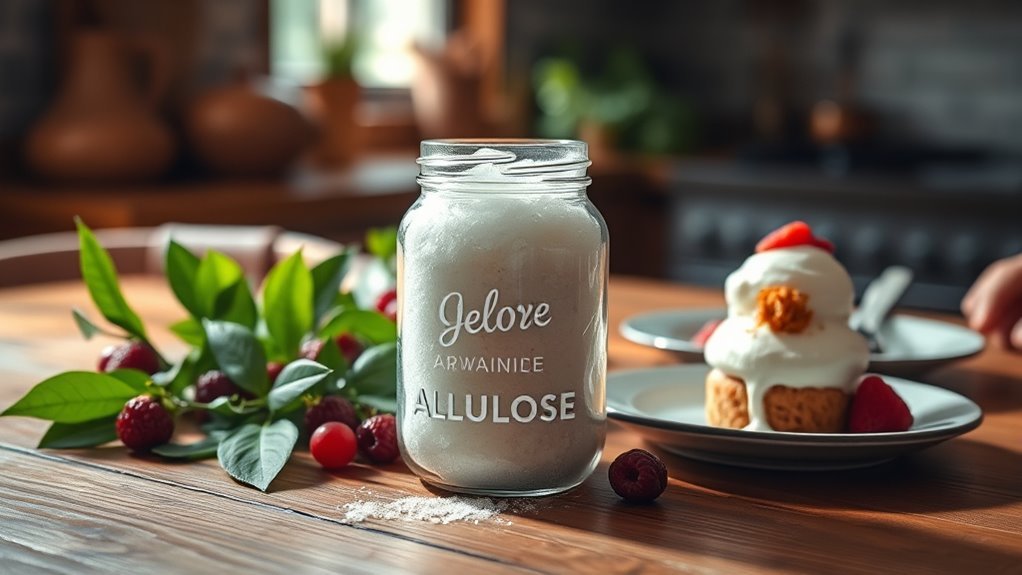Allulose is definitely keto-friendly! It has minimal calories and carbohydrates, so it won’t spike your blood sugar levels or disrupt ketosis. With about 90% fewer calories than sugar, it fits well into low-carb diets. However, large amounts might lead to digestive issues for some, so moderation is key. If you want to learn more about how to incorporate allulose into your meals and its benefits, there’s plenty more to explore!
What Is Allulose?

Allulose is a rare sugar that’s gaining popularity, especially among those following low-carb diets. Unlike traditional sugars, allulose has about 90% fewer calories and doesn’t spike blood sugar levels, making it an appealing option for many. It’s naturally found in small amounts in certain fruits, such as figs and raisins, which reflects its natural sources. Allulose production typically involves a process that converts fructose from corn or other plants into this unique sugar, ensuring its availability for commercial use. This process makes allulose a practical alternative for those seeking to reduce sugar intake without sacrificing sweetness. Its distinct properties offer you the freedom to enjoy sweet flavors while maintaining your dietary goals, making it a worthy consideration in your low-carb lifestyle.
Nutritional Profile of Allulose

When considering allulose, it’s crucial to look at its nutritional profile. This low-calorie sweetener contains minimal carbohydrates and has a negligible impact on blood sugar levels. Understanding these factors can help you determine how allulose fits into your dietary choices, especially on a keto diet.
Caloric Content Overview
Although many sweeteners can pack in calories, allulose stands out with its significantly lower caloric content. When you compare it to traditional sugar and other sweetener alternatives, allulose offers a unique profile that could align well with your dietary goals, especially if you’re following a keto lifestyle. Here’s a quick caloric comparison:
- Allulose: 0.2 calories per gram
- Sugar: 4 calories per gram
- Honey: 3 calories per gram
- Agave syrup: 3 calories per gram
- Stevia: 0 calories per gram
This lower caloric content makes allulose a favorable option for those looking to reduce calorie intake without sacrificing sweetness. By incorporating allulose, you can enjoy your favorite flavors while remaining mindful of your health choices.
Carb Count Analysis
While many sweeteners contain carbohydrates that can impact your keto diet, allulose is unique in that it has a negligible effect on blood sugar levels. This makes it an appealing choice for those seeking sugar alternatives. Allulose contains about 0.4 calories per gram and has a total carbohydrate count that’s typically rounded down to zero for nutritional labeling, emphasizing its keto compatibility. The health benefits of allulose include its ability to provide sweetness without the high carb load associated with traditional sugars. By incorporating allulose into your diet, you can enjoy sweet flavors while maintaining your low-carb lifestyle. It’s a fantastic option for anyone looking to satisfy their sweet tooth without derailing their keto goals.
Glycemic Impact Assessment
Since allulose has a unique nutritional profile, it’s essential to understand its glycemic impact, especially for those following a keto diet. Unlike traditional sugars, allulose has a low glycemic index, meaning it won’t spike your blood sugar levels considerably. This is vital for maintaining ketosis and managing insulin response.
Consider these key points about allulose:
- Low Glycemic Index: Ranges around 0-1, making it keto-friendly.
- Minimal Effect on Blood Sugar: Does not cause notable fluctuations.
- Reduced Insulin Response: Less impact than regular sugars.
- Caloric Contribution: Approximately 0.4 calories per gram.
- Versatile Usage: Can be used in various recipes without compromising ketosis.
Choosing allulose allows you to enjoy sweetness without the guilt.
How Allulose Affects Blood Sugar Levels

When you’re looking for sugar alternatives on a keto diet, understanding how allulose impacts blood sugar levels is essential. Research shows that allulose is a low-calorie sweetener that doesn’t greatly raise blood sugar. Unlike regular sugar, it has a negligible effect on your insulin response. This means you can enjoy sweetness without the spikes and crashes that come with traditional sugars. Allulose’s unique properties allow it to pass through your body without being fully absorbed, making it a favorable option for those managing their blood sugar levels. By incorporating allulose into your diet, you can satisfy your sweet tooth while maintaining keto’s principles, giving you the freedom to enjoy treats without sacrificing your health goals.
Allulose vs. Other Sweeteners
As you explore sweetener options on a keto diet, it’s important to compare allulose with other popular alternatives like erythritol, stevia, and monk fruit. Allulose offers unique benefits, such as having minimal calories and a low glycemic impact.
Here’s how it stacks up against the competition:
- Erythritol: Zero-calorie, but can cause digestive issues for some.
- Stevia: Natural, but some people find it has a bitter aftertaste.
- Monk Fruit: Calorie-free and no known side effects, but can be pricier.
- Allulose: Found in foods like figs and raisins, it mimics sugar’s taste without the carbs.
- Versatility: Allulose can be used in baking, unlike some alternatives.
Understanding allulose sources and benefits can help you make informed choices.
Benefits of Using Allulose on a Keto Diet
Allulose stands out among sweeteners not just for its low-calorie content but also for its compatibility with a keto diet. One of the significant health benefits of allulose is that it doesn’t spike your blood sugar levels, making it an ideal choice for those seeking to maintain ketosis. Its unique molecular structure means your body processes it differently than traditional sugars, aiding in weight management without sacrificing sweetness. You can enjoy desserts and beverages guilt-free, allowing you to stick to your dietary goals while still relishing the flavors you love. Incorporating allulose into your meals can enhance your culinary freedom on a keto journey, enabling you to balance indulgence with health-conscious choices effortlessly.
Potential Drawbacks of Allulose
While allulose offers many benefits, it’s important to contemplate some potential drawbacks as well. You might experience certain challenges when incorporating it into your diet. Here are some considerations:
- Taste preferences: Allulose has a slightly different flavor profile than sugar, which might not appeal to everyone.
- Digestive issues: Consuming large amounts can lead to bloating or gas for some individuals.
- Caloric impact: Although it’s low in calories, it isn’t entirely calorie-free, which could affect your macros.
- Availability: Allulose isn’t as widely available as other sweeteners, making it harder to find.
- Cost: It can be more expensive than traditional sugar or other sweeteners, impacting your budget.
Being aware of these potential drawbacks can help you make informed choices about your diet.
How to Incorporate Allulose Into Your Diet
If you’re looking to add a low-calorie sweetener to your diet, incorporating allulose can be both simple and versatile. This unique sweetener offers allulose benefits, like minimal impact on blood sugar levels, making it an excellent choice for those on a keto diet. You can use it in beverages, baked goods, or even savory dishes to reduce calories without sacrificing sweetness. If you’re not ready to commit fully, consider allulose substitutes like erythritol or stevia, which can also enhance flavors while keeping your carb count low. Start with small amounts to gauge how your body reacts, and feel free to experiment to find the right balance for your taste buds. Your journey to a sweeter, healthier lifestyle can begin today!
Recipes Featuring Allulose
When you’re looking to add allulose to your meals, there are plenty of creative recipes to explore. From delicious desserts that satisfy your sweet tooth to savory dishes that benefit from its unique flavor profile, allulose can enhance various culinary creations. Let’s look at some tasty options that showcase how versatile this sweetener can be in your kitchen.
Allulose Sweetener Overview
Allulose, a low-calorie sweetener that naturally occurs in small quantities in certain fruits, has gained popularity among those following low-carb and ketogenic diets. It offers several allulose benefits, making it an appealing option for those watching their sugar intake. You’ll find allulose sources in foods like figs, raisins, and jackfruit.
Here are a few highlights of allulose:
- Contains about 90% fewer calories than sugar
- Doesn’t spike blood sugar or insulin levels
- Provides a similar taste and texture to sugar
- Can be used in baking and cooking
- May support weight management
Incorporating allulose can help you enjoy sweet flavors while sticking to your dietary goals.
Delicious Allulose Desserts
For those looking to satisfy their sweet tooth while maintaining a low-carb lifestyle, allulose opens up a world of dessert possibilities. You can whip up allulose brownies that are fudgy and rich, allowing you to indulge without the guilt. Simply substitute traditional sugar with allulose in your favorite brownie recipe, and enjoy the same delightful taste with fewer carbs.
Another fantastic option is allulose cheesecake, which can be creamy and decadent. Use allulose to sweeten the filling, and you’ll create a dessert that’s not only keto-friendly but also incredibly satisfying. These recipes showcase how allulose can transform your favorite treats, giving you the freedom to enjoy desserts without compromising your dietary goals. Enjoy creating and tasting these delightful allulose desserts!
Savory Dishes With Allulose
While many associate allulose primarily with sweet desserts, this unique sugar substitute can also elevate savory dishes in exciting ways. You can use allulose to create delicious marinades and savory sauces that balance flavors without added sugar. Here are some ideas to get you started:
- Allulose-infused BBQ sauce for grilling meats
- Savory allulose marinades for chicken or tofu
- Sweet-and-sour stir-fry sauce using allulose
- Savory salad dressings with allulose for a hint of sweetness
- Glazes for roasted vegetables that enhance natural flavors
Final Thoughts on Allulose and Keto
As you navigate your keto journey, it’s important to understand how allulose fits into your dietary choices. This low-calorie sweetener offers several health benefits while keeping your carb count low. However, some may experience digestive effects, so it’s wise to monitor your body’s response.
| Health Benefits | Digestive Effects |
|---|---|
| Lowers blood sugar | Possible bloating |
| Supports weight loss | Gas and discomfort |
| No insulin spike | Varying tolerance |
| Sweet without guilt | Caution recommended |
| Enhances flavor | Moderation advised |
Ultimately, allulose can be a valuable addition to your keto diet if used thoughtfully. Embrace the freedom to enjoy sweetness while prioritizing your health!
Frequently Asked Questions
Can Allulose Be Used in Baking Recipes?
Yes, you can definitely use allulose in baking recipes! In fact, studies show that allulose can reduce sugar calories by up to 90%, making it an appealing option. When you’re looking for recipe substitutions, remember to use about 1 cup of allulose for every cup of sugar, but keep in mind that it doesn’t caramelize like regular sugar. Try these baking tips, and you’ll enjoy delicious treats without the guilt!
Is Allulose Safe for Children?
Yes, allulose is generally considered safe for children when consumed in moderation. It offers several benefits, like being low in calories and not raising blood sugar levels, making it a good alternative to traditional sugars. However, some children might experience digestive discomfort if they consume too much. If you’re looking for allulose alternatives, consider erythritol or stevia, which also provide sweetness without the calories. Always consult with a pediatrician for personalized advice.
Does Allulose Cause Digestive Issues?
Imagine your stomach as a calm sea, but sometimes, allulose can stir the waters. In some people, allulose digestion may lead to mild digestive issues like bloating or gas, especially if your sweetener tolerance is low. Research suggests that these effects are generally mild and vary by individual. For many, allulose is a gentle wave in their diet, offering sweetness without harsh consequences. Always listen to your body and adjust accordingly for smooth sailing!
Can Allulose Be Used in Beverages?
Absolutely, you can use allulose in beverages! Its unique flavor profile closely resembles that of sugar, making it a great choice for allulose beverage recipes. It dissolves well, ensuring a smooth texture in drinks, from teas to smoothies. Plus, it’s low in calories and doesn’t spike blood sugar, giving you the freedom to enjoy sweetened drinks without guilt. Just remember to adjust quantities, as it’s less sweet than regular sugar.
What Is the Shelf Life of Allulose?
Allulose typically has a shelf life of about two years when stored properly. To guarantee ideal shelf stability, keep it in a cool, dry place away from direct sunlight. It’s important to avoid high humidity, as this can affect its quality. If you follow these storage conditions, you can maintain its sweetness and texture for an extended period. Enjoy the freedom to use allulose in your favorite recipes without worrying about spoilage!
Frequently Asked Questions about Allulose and Keto
1. Is allulose considered keto-friendly?
Yes, allulose is generally considered keto-friendly. It is a low-calorie sweetener that contains minimal carbohydrates and does not significantly impact blood sugar levels. This makes it suitable for those following a ketogenic diet, which emphasizes low carbohydrate intake.
2. How many carbs does allulose contain?
Allulose contains about 0.4 calories per gram and approximately 1 gram of carbohydrate per serving. However, it is often classified as a “non-digestible” carbohydrate, meaning it has a negligible impact on overall carbohydrate counts in a keto diet.
3. Does allulose affect blood sugar levels?
No, allulose does not significantly raise blood sugar levels. Research indicates that it has a minimal glycemic index, which makes it an excellent sugar substitute for those monitoring their blood sugar, such as individuals on a keto diet or those with diabetes.
4. Can allulose be used in baking for keto recipes?
Yes, allulose can be used in baking. It behaves similarly to sugar in recipes, providing sweetness and moisture without the calories and carbs associated with regular sugar. However, it may not caramelize like sugar, so adjustments may be needed in certain recipes.
5. Are there any side effects of consuming allulose?
While allulose is generally recognized as safe, some individuals may experience gastrointestinal discomfort if consumed in large quantities. It’s advisable to start with small amounts to assess your tolerance. Unlike other sugar substitutes, allulose is less likely to cause digestive issues in moderate use.
References
- https://www.ncbi.nlm.nih.gov/pmc/articles/PMC6012050/
- https://www.healthline.com/nutrition/allulose
- https://www.verywellfit.com/what-is-allulose-5192241
- https://www.sciencedirect.com/science/article/pii/S221261511400027X
- https://www.webmd.com/diet/allulose-what-is-it
- https://www.wikihealth.org/allulose


